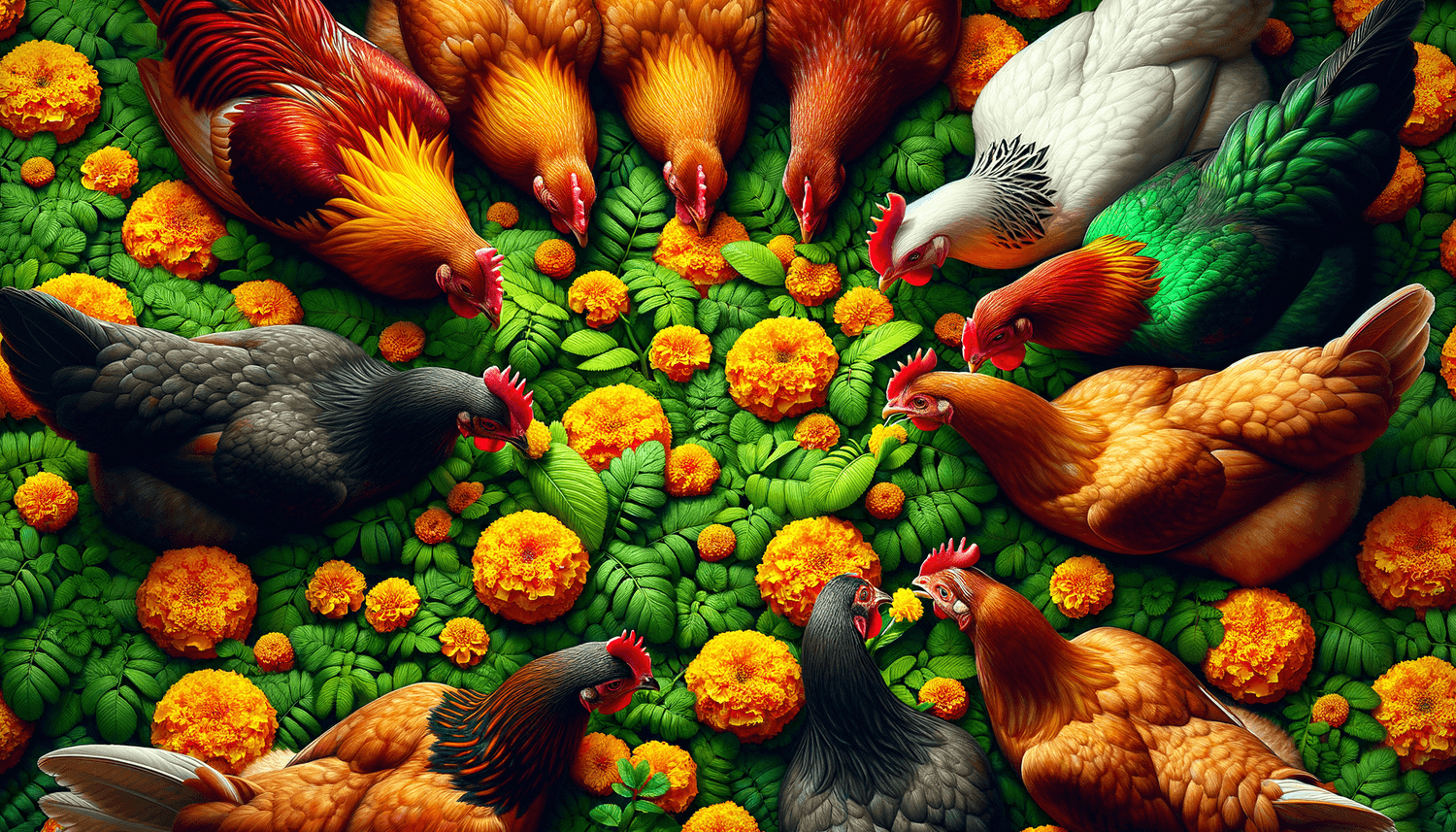Hey there, chicken whisperers! Ever gazed at your blooming backyard and wondered if your fluffy, feathery friends can feast on those bright and beautiful marigold leaves? Well, you’re in the right coop, ahem, place! In this cluck-tastic blog post, we’ll scratch the surface on whether chickens can eat marigold leaves, the importance of their balanced diet, the benefits and/or risks associated with this floral snack, the nutritional value it offers, and even some egg-citing ways to serve up these colorful leaves for your chatty chicks. So fluff up those feathers and join us in the garden for an entertaining journey through the world of marigold munchies!
Can chickens eat marigold leaves?
Yes, chickens can safely eat marigold leaves. Marigolds are non-toxic and provide an appealing snack for your feathered friends. Not only are marigold leaves safe for your chickens, but they also offer various health benefits and are a delightful addition to a well-rounded diet for your flock.
A balanced diet for happy hens
Just like us humans, chickens thrive on a balanced diet that provides them with all the essential nutrients they need to stay healthy and content. The foundation of a chick’s diet should be high-quality chicken feed, which should make up a clucking-good 80-90% of their overall food intake. This chicken feed is specifically designed to meet their nutritional needs, ensuring a well-rounded diet that will keep your feathery friends laying eggs and strutting their stuff with vigor.
Now, while chicken feed should be the main course, it’s also important to vary their diet with some tasty extras. The remaining 10-20% of a chicken’s diet can consist of delicious treats like fruits and vegetables. These treats not only add pizzazz to their menu but also supplement their nutritional intake with valuable vitamins, minerals, and fiber. Just remember, moderation is the key, because too many treats may lead to unbalanced nutritional intake or obesity, which can affect the health and egg-laying ability of your flock.
Nutritional value of marigold leaves for chickens.
Feeding marigold leaves to your chickens definitely comes with some nutritional perks. These vibrant leaves are packed with a variety of vitamins and minerals that can boost the health of your feathery friends. One significant health benefit marigold leaves offer is their high content of vitamin A, which contributes to maintaining healthy skin, feathers, and improved eyesight.
Marigold leaves are also a good source of vitamin C and antioxidants, which help strengthen the immune system, maintain healthy tissue, and prevent cell damage. This means that by adding marigold leaves to your chicken’s treat menu, you’re actually contributing to their overall well-being, helping them become more resistant to diseases and infections.
In addition to vitamins, marigold leaves provide hydration to your chickens due to their high water content. This can be especially beneficial during hot summer days when your flock needs a little extra hydration to keep them comfortable and thriving. Feeding marigold leaves to your chickens can therefore be both an enjoyable snack and an excellent way to contribute to their health and happiness.
Nutrition table of marigold leaves for chickens.
| Information | Description |
|---|---|
| Nutritional Value | High in vitamins A and C, antioxidants, and various minerals |
| Suggested Serving Size | Small handful mixed with other treats |
| Safe Feeding Practices | Introduce gradually and monitor for any adverse reactions |
| Preparation | Wash and chop leaves, then mix with other treats or scatter in the run |
| Potential Risks | Overconsumption may cause unbalanced diet and obesity |
| Hydration | High water content helps keep chickens hydrated |
| Digestion | Marigold leaves can help with digestion and gut health |
| Seasonal Availability | Abundant during spring and summer months |
| Other Benefits | Boosts immune system, maintains healthy skin, feathers, and eyesight |
Introducing marigold leaves to your chicken’s diet
When introducing marigold leaves or any new treat to your chicken’s diet, do so gradually. Start by offering a small amount and ensure your flock doesn’t experience any adverse reactions. Gradually increase the servings as you gain confidence in their tolerance for marigold leaves. Remember that marigold leaves should be offered as treats, not a substitute for high-quality chicken feed.
Prepping marigold leaves for your chickens
Now that you have the green light to feed marigold leaves to your chickens, here’s how to prepare the leaves. Begin by thoroughly washing the marigold leaves to remove pesticides or other contaminants that could harm your flock. After washing, chop the leaves into small, manageable pieces. You can either mix the marigold leaves with other treats or scatter them in the run for the chickens to forage, providing a fun and engaging mealtime activity.
Grow your own marigolds
If you’d like a reliable supply of marigold leaves for your feathered friends, consider growing your own marigolds in your garden or in pots. Marigolds are easy to maintain, drought-tolerant, and resistant to most pests. The flowers also have the added benefit of repelling certain pests and attracting beneficial insects, making them an excellent addition to both your garden and your chicken’s diet.
In conclusion
Feeding marigold leaves to your chickens offers numerous health benefits and adds variety to their diet. Keep treats like marigold leaves in moderation, maintaining a diet primarily composed of high-quality chicken feed. Always remember, a balanced diet with proper care can provide your chickens a long, healthy, and happy life.

















